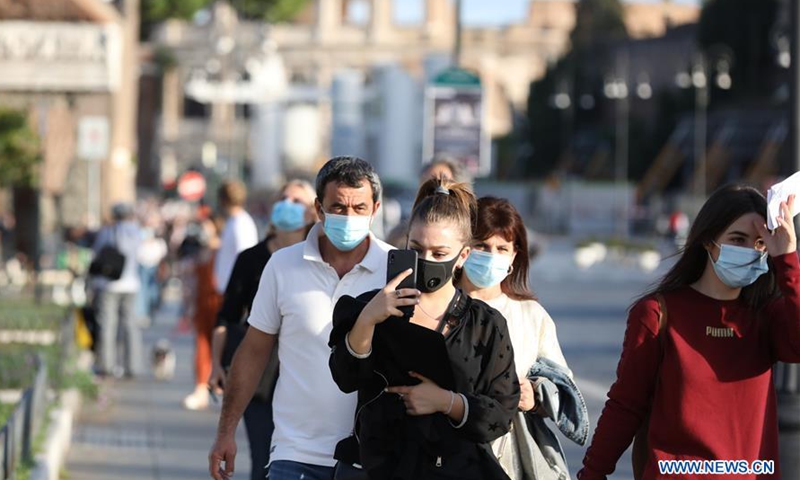Europe virus deaths hit 250,000
Source: AFP Published: 2020/10/19 17:28:42
Israel flattens outbreak; Melbourne relaxes restrictions

People wearing face masks walk on Via dei Fori Imperiali in Rome, Italy, Oct 6, 2020. Five southern regions of Italy have introduced mandatory mask laws, even for people in open spaces. And the government has announced that the national state of emergency, first put into place on Jan. 31, would be extended "at least" until its one-year anniversary.Photo:Xinhua
Europe passed the milestone of 250,000 deaths from COVID-19 on Sunday as Israel and Australia's second-largest city of Melbourne began to gradually ease their strict lockdowns.
European nations have ratcheted up restrictions on daily life to tackle soaring infections, with a 44 percent increase in cases last week.
Nighttime curfews on millions came into force in France last weekend and Switzerland required all its citizens to wear masks in indoor public places.
But Israel has managed to flatten its outbreak through draconian measures including a ban on travelling more than a kilometer from home.
The government lifted that restriction on Sunday and reopened kindergartens, beaches and national parks.
Israeli mother Talia Zinkin said she was initially unsure whether to send her son back to daycare. "But I felt he would enjoy being with other children," she told AFP.
In Australia, Melbourne has managed to control its upsurge in cases and officials were able to allow the city's 5 million inhabitants to leave their homes for more than two hours a day for the first time in three months.
While people will be allowed to travel up to 25 kilometers from home if they have valid reasons.
In Europe however, the increase in cases is reaching alarming levels.
Europe's death toll makes it the second-hardest hit region after Latin America and the Caribbean, where fatalities have surpassed 350,000.
The UK remains Europe's worst-affected country in terms of deaths, accounting for almost one-fifth of fatalities on the continent.
It continues to struggle against the virus, with local officials resisting attempts to impose restrictions by region.
France counted nearly 30,000 new cases Sunday, close to Saturday's record 32,427 cases. Some 1,900 COVID-19 patients are currently occupying intensive care unit beds, out of France's total capacity of 5,800.
The government has introduced a 9 pm-6 am curfew for at least a month in nine cities including Paris, affecting 20 million people.
Those flouting the curfew face a fine of 135 euros ($158) unless they can prove they have a valid reason to be out.
"I'm coming back from the hospital... where my daughter is being operated on," one man told a group of police officers, showing them a one-page document as evidence.
The measures fall short of the blanket confinements imposed in many countries earlier in 2020 - but raise fears of new, severe restrictions across the continent.
The Swiss government said Sunday it would enforce mask-wearing in all indoor public spaces from Monday and forbid gatherings of more than 15 people, among other restrictions.
Posted in: CROSS-BORDERS